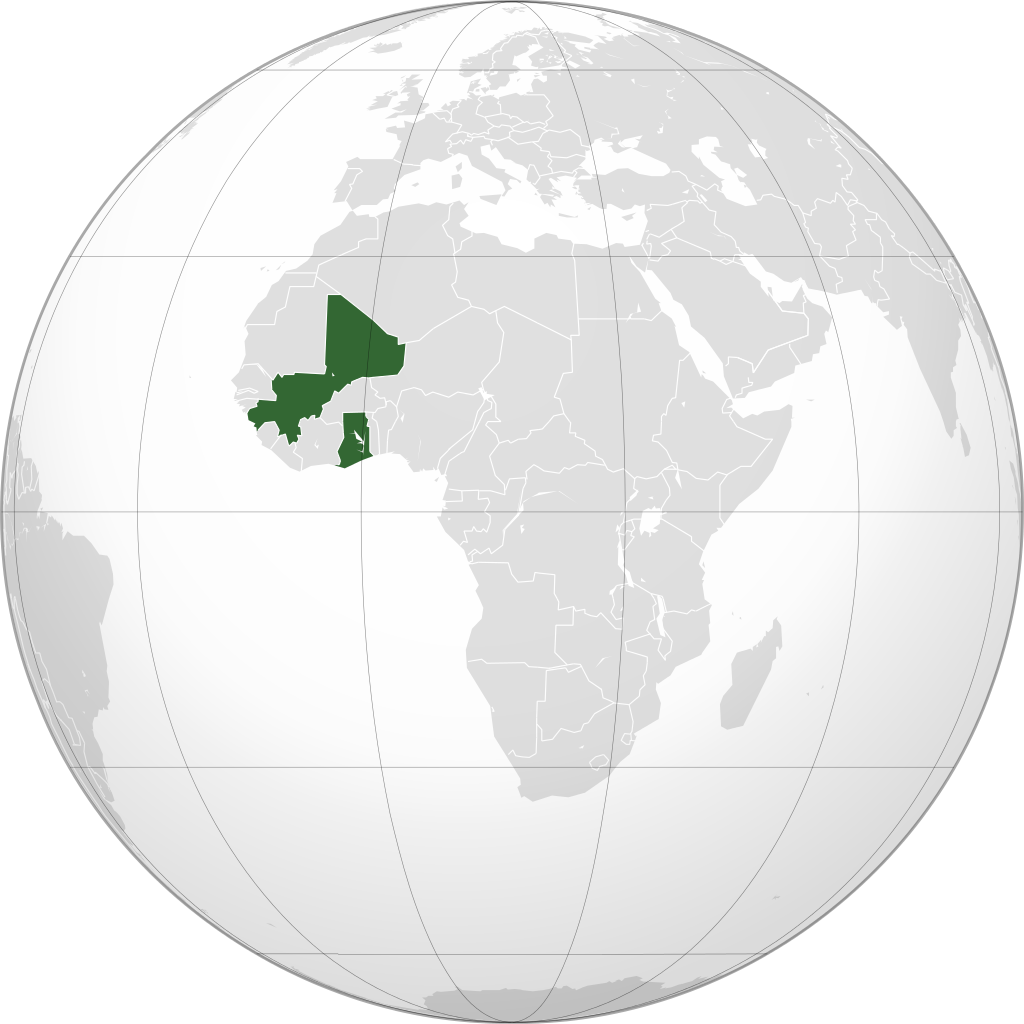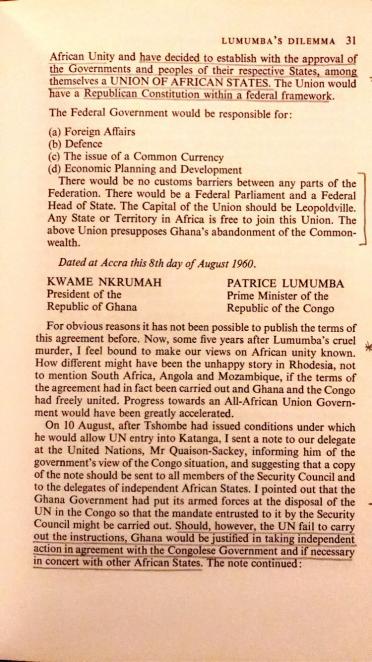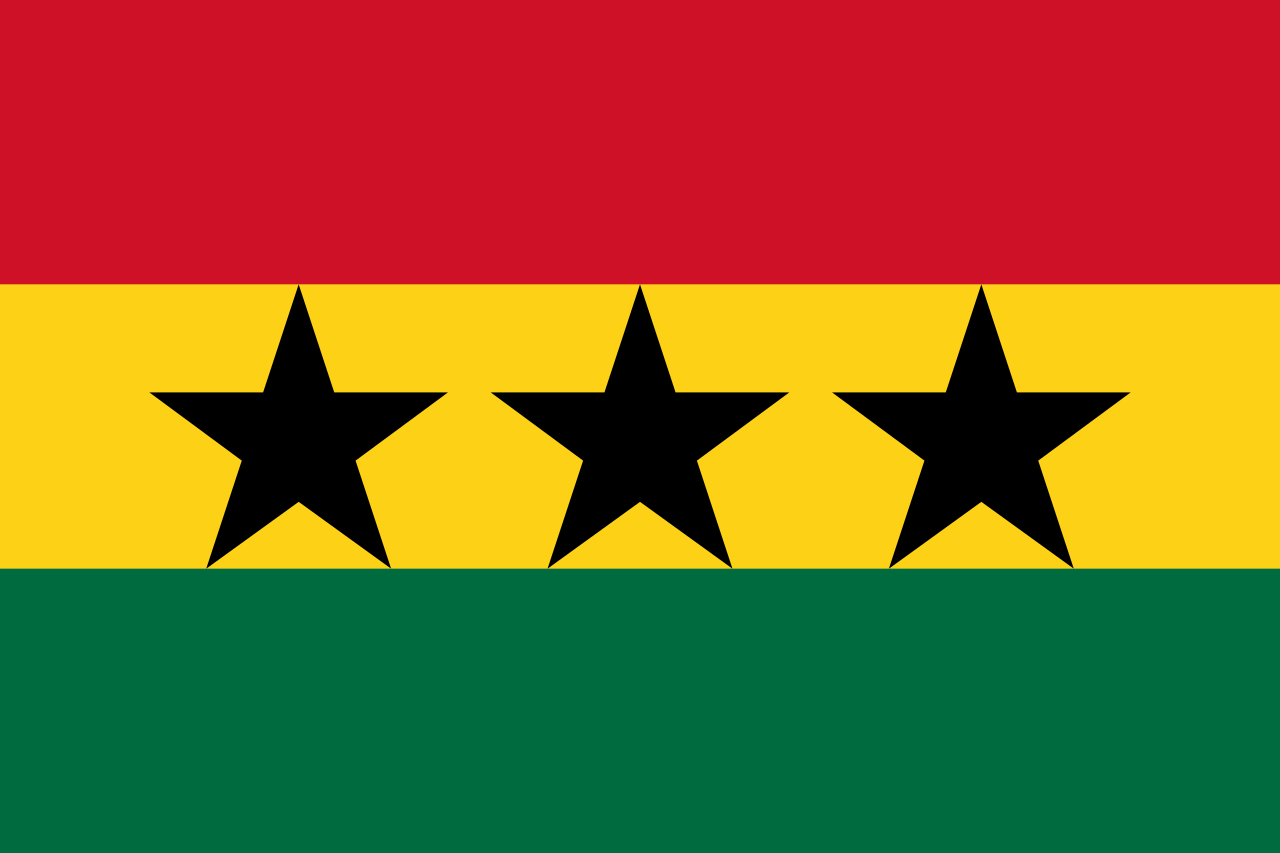mNo edit summary Tag: Visual edit |
(Added a bit about the UAS attempt at cooperation with the USSR) Tag: Visual edit |
||
| Line 1: | Line 1: | ||
{{Infobox country|name=Union of African States|image_flag=Flag of the Union of African States (1961–1963).png|capital=Accra (Ghana)<br>Conakry (Guinea)<br>Bamako (Mali)|mode_of_production=Socialism|government_type=Loose Confederacy|image_map=Union of African States orthographic projection.png}} | {{Infobox country|name=Union of African States|image_flag=Flag of the Union of African States (1961–1963).png|capital=Accra (Ghana)<br>Conakry (Guinea)<br>Bamako (Mali)|mode_of_production=Socialism|government_type=Loose Confederacy|image_map=Union of African States orthographic projection.png}} | ||
[[File:Nkrumah - Lumumba Agreement.jpg|thumb|Lumumba's agreement for Congo to join the Union of African States]] | [[File:Nkrumah - Lumumba Agreement.jpg|thumb|Lumumba's agreement for Congo to join the Union of African States]] | ||
The '''Union of African States''', sometimes referred to as the '''Ghana–Guinea–Mali Union''', was a loose organization established in 1958 between the socialist governments of [[Kwame Nkrumah]] in [[Republic of Ghana|Ghana]] and [[Sékou Touré|Sekou Toure]] in [[Republic of Guinea|Guinea]]. [[Republic of Mali|Mali]] joined in 1961 prior to the union's dissolution two years later. The Union was an attempt at building a continental federation of states based in Kinshasa, [[Democratic Republic of the Congo|Congo]], though this later failed due to the murder of [[Patrice Lumumba|Lumumba]].<ref>Challenge of the Congo by Kwame Nkrumah</ref> Among the developments of telecommunication, judicial and transportation agreements were attempts at establishing a common currency, though this never came into fruition.<ref>[https://books.google.com/books?id=_6eglzXVDcMC&pg=PA122#v=onepage&q&f=false Personal Reflections of a Ghanaian Foreign Service Officer]</ref> | The '''Union of African States''' (UAS), sometimes referred to as the '''Ghana–Guinea–Mali Union''', was a loose organization established in 1958 between the socialist governments of [[Kwame Nkrumah]] in [[Republic of Ghana|Ghana]] and [[Sékou Touré|Sekou Toure]] in [[Republic of Guinea|Guinea]]. [[Republic of Mali|Mali]] joined in 1961 prior to the union's dissolution two years later. The Union was an attempt at building a continental federation of states based in Kinshasa, [[Democratic Republic of the Congo|Congo]], though this later failed due to the murder of [[Patrice Lumumba|Lumumba]].<ref>Challenge of the Congo by Kwame Nkrumah</ref> Among the developments of telecommunication, judicial and transportation agreements were attempts at establishing a common currency, though this never came into fruition.<ref>[https://books.google.com/books?id=_6eglzXVDcMC&pg=PA122#v=onepage&q&f=false Personal Reflections of a Ghanaian Foreign Service Officer]</ref> After the formation of the Organization of African Unity (OAU), Nkrumah and his government sought Soviet aid in the development of the UAS. This resulted in the dispatching of professor Vladimir Aboltin and Viktor Kulikov to Accra to help Nkrumah plan the development of the union. In which, Soviet researchers helped plan out the stages for an Economic Association of African states, Pan-African Customs union and a Central African Bank as a means of loosening Europe's neocolonial grip on the continent. While reporting back to Moscow, Aboltin would report very critically of Pan-Africanism, declaring it a racist ideology that contradicts with Marxism-Leninism. The USSR would later refuse to send financial aid to build the UAS.<ref>[https://books.google.com/books?id=xI5DEAAAQBAJ&pg=PA66&lpg=PA66&dq=AVP+RF.+F.+(fond,+collection)+0573.+Op.+(opis%E2%80%99,+inventory)+8.+P.+(papka,+folder)+14.+D.+(delo,+file)+7.+L.+(list,+page)+23%E2%80%9324.+Memorandum+by+V.+Ya.+Aboltin+to+the+Central+Committee+of+the+CPSU+%E2%80%9COn+Pan-Africanism,%E2%80%9D+February+26,+1964+(In+Russian).&source=bl&ots=GaYDFBoTth&sig=ACfU3U0Zhp6b_D8IavRkedZevNLi7qSkKQ&hl=en&sa=X&ved=2ahUKEwjs09vpg_H-AhXVF1kFHZQ3CUoQ6AF6BAgHEAM#v=onepage&q=AVP%20RF.%20F.%20(fond%2C%20collection)%200573.%20Op.%20(opis%E2%80%99%2C%20inventory)%208.%20P.%20(papka%2C%20folder)%2014.%20D.%20(delo%2C%20file)%207.%20L.%20(list%2C%20page)%2023%E2%80%9324.%20Memorandum%20by%20V.%20Ya.%20Aboltin%20to%20the%20Central%20Committee%20of%20the%20CPSU%20%E2%80%9COn%20Pan-Africanism%2C%E2%80%9D%20February%2026%2C%201964%20(In%20Russian).&f=false Africa and the Formation of the New System of International Relations]</ref> | ||
== References == | == References == | ||
<references /> | <references /> | ||
[[Category:Countries targeted by imperialist aggression]] | [[Category:Countries targeted by imperialist aggression]] | ||
Revision as of 00:44, 13 May 2023
| Union of African States | |
|---|---|
|
Flag | |
 | |
| Capital | Accra (Ghana) Conakry (Guinea) Bamako (Mali) |
| Dominant mode of production | Socialism |
| Government | Loose Confederacy |

The Union of African States (UAS), sometimes referred to as the Ghana–Guinea–Mali Union, was a loose organization established in 1958 between the socialist governments of Kwame Nkrumah in Ghana and Sekou Toure in Guinea. Mali joined in 1961 prior to the union's dissolution two years later. The Union was an attempt at building a continental federation of states based in Kinshasa, Congo, though this later failed due to the murder of Lumumba.[1] Among the developments of telecommunication, judicial and transportation agreements were attempts at establishing a common currency, though this never came into fruition.[2] After the formation of the Organization of African Unity (OAU), Nkrumah and his government sought Soviet aid in the development of the UAS. This resulted in the dispatching of professor Vladimir Aboltin and Viktor Kulikov to Accra to help Nkrumah plan the development of the union. In which, Soviet researchers helped plan out the stages for an Economic Association of African states, Pan-African Customs union and a Central African Bank as a means of loosening Europe's neocolonial grip on the continent. While reporting back to Moscow, Aboltin would report very critically of Pan-Africanism, declaring it a racist ideology that contradicts with Marxism-Leninism. The USSR would later refuse to send financial aid to build the UAS.[3]
References
- ↑ Challenge of the Congo by Kwame Nkrumah
- ↑ Personal Reflections of a Ghanaian Foreign Service Officer
- ↑ Africa and the Formation of the New System of International Relations
